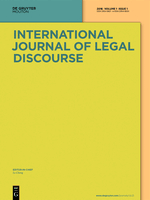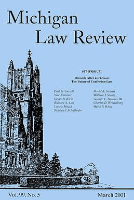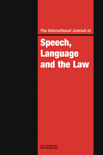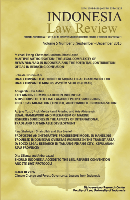
International Journal of Legal Discourse
Scope & Guideline
Exploring the Intersection of Law and Language
Introduction
Aims and Scopes
- Legal Discourse Analysis:
The journal focuses on the analysis of legal language and discourse, examining how language constructs legal realities, influences judicial decisions, and shapes public understanding of the law. - Interdisciplinary Approaches:
It encourages contributions that integrate legal studies with fields such as linguistics, semiotics, sociology, and cognitive science, fostering a holistic understanding of legal discourse. - Emerging Technologies and Law:
Research exploring the intersections of technology, such as artificial intelligence and cyber law, with legal discourse is emphasized, reflecting contemporary challenges in legal systems. - Cross-Cultural and Comparative Studies:
The journal supports studies that compare legal discourses across different jurisdictions, enhancing understanding of how cultural contexts influence legal language and practices. - Critical Legal Studies:
The journal is committed to critical examination of legal texts and practices, focusing on issues such as power dynamics, social justice, and the implications of legal language on marginalized communities.
Trending and Emerging
- Cyber Law and Digital Discourse:
There is a growing emphasis on the legal implications of digital technologies, including cybercrime and AI regulation, highlighting the need for new legal frameworks that address the complexities of the digital age. - Language and Identity in Legal Contexts:
Research exploring the intersection of language, identity, and law is on the rise, particularly in relation to marginalized groups and bilingual legal systems, showcasing the importance of language in shaping legal identities. - Discourse in Judicial Decision-Making:
An increasing number of studies focus on the discourse employed in judicial decision-making processes, analyzing how language influences legal outcomes and public perceptions of justice. - Critical Examination of Legal Narratives:
There is a trend towards critically examining the narratives constructed within legal texts, particularly in relation to social justice issues, power dynamics, and the representation of vulnerable populations. - Intersemiotic Legal Translation:
Emerging studies on intersemiotic legal translation indicate a growing interest in how various forms of communication (e.g., visual, textual) interact in legal contexts, emphasizing the complexity of legal interpretation.
Declining or Waning
- Traditional Legal Theory:
There is a noticeable decline in papers focused solely on traditional legal theories without the integration of discourse analysis or contemporary issues, suggesting a move towards more applied and interdisciplinary research. - Historical Legal Studies:
Papers examining historical legal texts or practices seem to be less frequent, indicating a potential waning interest in historical perspectives in favor of contemporary legal discourse and its implications. - Static Legal Frameworks:
Research centered on static interpretations of legal frameworks without consideration of dynamic societal changes is becoming less common, reflecting a shift towards more adaptive and responsive legal discourse.
Similar Journals

MICHIGAN LAW REVIEW
Exploring the Intersection of Law and SocietyMICHIGAN LAW REVIEW, published by the Michigan Law Review Association, stands as a prestigious journal in the field of law, offering an influential platform for critical legal scholarship and discussion. With an ISSN of 0026-2234 and an E-ISSN of 1939-8557, this journal features a longstanding commitment to analyzing contemporary legal issues and contributing to academic dialogue. Situated in the United States, the journal reflects a rich historical legacy, with converged publication years stretching from 1974 to present, thereby preserving its position as a key resource for legal researchers and practitioners. Ranked in the Q1 category within its field for 2023, and holding a notable Scopus rank of 276 out of 1025 in the Social Sciences _ Law category, it plays a critical role in shaping legal thought and policy. Although not open access, its detailed articles and comprehensive reviews are instrumental for law students, academics, and legal professionals who seek to stay at the forefront of legal scholarship.

International Journal of Speech Language and the Law
Transforming Legal Discourse Through Linguistic ResearchInternational Journal of Speech Language and the Law is a pioneering academic journal dedicated to the intersection of language, law, and forensic linguistics. Published by EQUINOX PUBLISHING LTD in the United Kingdom, this journal has been a vital resource since its inception in 1999, covering a broad spectrum of topics relevant to linguists, legal practitioners, and scholars alike. With an impact factor that reflects its growing importance—ranking Q3 in Law and Q2 in Linguistics and Language—this journal offers a forum for innovative research, case studies, and theoretical discussions. Researchers will find value in its accessible articles that challenge existing paradigms and provide insights into the use of language in legal contexts. Although it operates under a subscription model, the journal's contribution to the field is underscored by its Scopus rankings, making it a worthwhile consideration for anyone engaged in the study of how language affects legal processes. Engage with the journal's rich content to enhance your understanding and contribute to this scholarly dialogue.

University of Western Australia Law Review
Exploring the Frontiers of Legal ScholarshipThe University of Western Australia Law Review is a prestigious academic journal dedicated to the critical examination and exploration of legal issues in Australia and beyond. Published by the Law School of the University of Western Australia, this journal has become a significant resource for legal scholars, practitioners, and students alike, contributing to the rich discourse in the field of law. With an ISSN of 0042-0328 and a current categorization in the Q3 quartile in the field of Law as per the 2023 rankings, it stands among a cohort of respected legal publications. The journal, though not open access, facilitates a sharing of unique insights and research from 2019 to 2024, aiming to address emerging and traditional legal challenges within a global context. With a Scopus rank of #651 out of 1025 in Social Sciences Law, it holds a percentile of 36, reflecting its valuable contributions to legal scholarship. The University of Western Australia Law Review invites researchers, practitioners, and students to engage with its rich content and to contribute to the ongoing dialogue shaping the future of law.

Revista General de Derecho Europeo
Fostering Dialogue in European Legal StudiesRevista General de Derecho Europeo is a prestigious academic journal dedicated to the study of European law, published by IUSTEL, a notable publisher recognized for its commitment to legal scholarship. This journal serves as a vital platform for the dissemination of cutting-edge research, fostering dialogue among scholars, practitioners, and policymakers in the field of European legal studies. With an ISSN of 1696-9634, it provides no-cost access to a diverse range of articles, ensuring that the latest developments in European jurisprudence are readily available to a broad audience. Although specific impact metrics such as the H-index are not detailed, the journal’s emphasis on quality and relevance positions it as an essential resource for anyone engaged in exploring the complexities of European law, its implications, and its evolution within a global context. Revista General de Derecho Europeo not only contributes to academic discourse but also equips its readers with critical insights necessary for navigating contemporary legal challenges in Europe.

Revista do Curso de Direito do UNIFOR
Elevating the conversation in legal education.Revista do Curso de Direito do UNIFOR, with ISSN 2236-7632, is a distinguished academic journal published by FUNDACAO EDUCACIONAL COMUNITARIA FORMIGUENSE in Brazil. Specializing in the field of legal studies, this journal aims to disseminate high-quality research that contributes to the understanding and development of legal theory and practice. Although the journal is currently not Open Access, it serves as a valuable platform for scholars and practitioners to share insights and advancements in law, fostering a robust dialogue among legal professionals, academics, and students. By maintaining rigorous academic standards, Revista do Curso de Direito do UNIFOR plays a crucial role in shaping legal discourse and encouraging interdisciplinary collaboration within the broader context of legal education. Researchers and students alike are encouraged to submit their work to advance the academic community's knowledge and engagement in contemporary legal issues.

SYDNEY LAW REVIEW
Illuminating Contemporary Legal IssuesSYDNEY LAW REVIEW is a prestigious academic journal published by the Sydney Law School, dedicated to the field of legal studies and interdisciplinary analysis of law and its impact on society. With its ISSN 0082-0512 and E-ISSN 1444-9528, this journal serves as a vital resource for legal scholars, researchers, and practitioners in Australia and globally. The journal has undergone several phases since its inception in 1990, reflecting the evolving landscape of legal scholarship and policy. Although currently not an open-access publication, it remains a significant contributor to legal discourse, maintaining a Q4 ranking in the Law category as per the 2023 category quartiles. The SYDNEY LAW REVIEW encourages submissions that critically explore contemporary legal issues, thereby fostering a robust platform for academic inquiry and professional advancement.

INTERNATIONAL JOURNAL FOR THE SEMIOTICS OF LAW-REVUE INTERNATIONALE DE SEMIOTIQUE JURIDIQUE
Advancing Understanding of Law's Linguistic DimensionsINTERNATIONAL JOURNAL FOR THE SEMIOTICS OF LAW-REVUE INTERNATIONALE DE SEMIOTIQUE JURIDIQUE, published by Springer, stands as a vital intellectual platform within the interdisciplinary fields of law and linguistics. With an ISSN of 0952-8059 and an E-ISSN of 1572-8722, this esteemed journal has served the academic community since its inception in 1988 and continues to publish insightful research until 2024. Recognized in the 2023 rankings, it achieves Q2 status in Law and Q1 in Linguistics and Language, affirming its influence and relevance in scholarly discourse. Featuring a strong performance in Scopus rankings—comprising Rank #192 and Percentile 82nd in Language and Linguistics and Rank #254 and Percentile 75th in Law—this journal is curating high-quality contributions that explore the intersection of legal systems and semiotic theory. Despite having no open access option, it continues to disseminate important research that illuminates the semiotic dimensions of legal discourse, making it an invaluable resource for researchers, professionals, and students interested in the evolving landscape of legal and linguistic studies.

Quaestio Iuris
Connecting Scholars to Contemporary Legal ChallengesQuaestio Iuris is a distinguished academic journal that has been making significant strides in the field of legal studies since its establishment. Published by the Universidade do Estado do Rio de Janeiro, this Open Access journal, operational since 2005, fosters a dynamic platform for the dissemination of innovative research, critical analysis, and scholarly discourse in various branches of law. With its ISSN 1807-8389 and E-ISSN 1516-0351, Quaestio Iuris is committed to enriching the legal academic landscape, ensuring that valuable insights are accessible to researchers, professionals, and students worldwide. The journal is dedicated to exploring contemporary legal challenges and contributing to the evolution of legal theory and practice, all while maintaining the highest standards of academic integrity. It is positioned to serve as an essential resource for those who aim to engage with the intricacies of legal scholarship.

Indonesia Law Review
Navigating the Intersection of Law and Social SciencesIndonesia Law Review is a premier open-access academic journal dedicated to advancing knowledge in the fields of law and social sciences, with particular emphasis on the Indonesian legal landscape. Established by the Indonesian Law Review, this journal has made significant strides since becoming open access in 2014, ensuring that research is freely available to a global audience. Based in Depok, West Java, the journal seeks to foster scholarly discourse on legal issues pertinent to Indonesia, while also contributing to the broader field of education and social sciences. With its current Scopus rankings placing it within the top tiers of law and social sciences, including a Q3 categorization in law and a Q4 classification in education and miscellaneous social sciences, the **Indonesia Law Review** serves as a vital platform for researchers, professionals, and students to disseminate their findings and engage with contemporary legal dilemmas. The journal is committed to providing a robust forum for innovative legal scholarship and is an essential resource for anyone seeking to understand the complexities of law in Indonesia and beyond.

GEORGETOWN LAW JOURNAL
Advancing Legal Scholarship Since 1973GEORGETOWN LAW JOURNAL, published by the Georgetown Law Journal Association, is a premier academic journal dedicated to advancing scholarship in the field of law. With its long-standing history dating back to 1973, this esteemed publication facilitates critical discourse on a wide range of legal issues, contributing significantly to both theoretical and practical advancements within the legal community. The journal, bearing the ISSN 0016-8092, operates exclusively in print and does not offer open access, allowing it to maintain a rigorous standard of peer-reviewed content that is well-regarded amongst legal scholars, practitioners, and students alike. Ranked in the Q2 category of law journals as per the 2023 category quartiles, and positioned at 746th out of 1025 in Scopus rankings, it provides a valuable platform for the dissemination of high-quality research. The journal's commitment to excellence is reflected in its broad scope, covering topics from constitutional law to international matters, ensuring it remains a vital resource for anyone engaged in legal studies. As we navigate complex legal landscapes, the GEORGETOWN LAW JOURNAL stands out as a critical conduit for emerging ideas and scholarly debates in the ever-evolving domain of law.